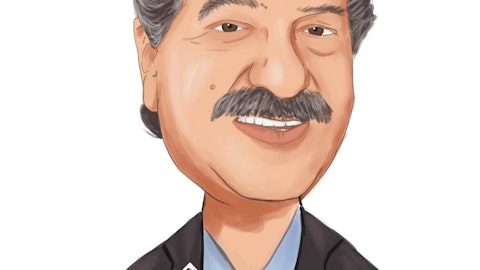Brian Mackey: Well, I think we have a number of opportunities. As I just mentioned, I think we have — clearly have growth opportunities with hermetic packaging. I think we have some interesting things that we’re considering within metal matrix composites. We also have this ongoing installations of armor solutions on the aircraft carriers, which is exciting knowing that we have a solution that the Army is excited by and interested in, lightweight, kind of ballistic protection, et cetera. And what I consider our fourth category, which is these new things that we’re actively working on, I think that’s going to yield results. And as I mentioned a minute ago, I mean, when the DoD needs something, they need something, sometimes you have to wait for their validation process and the right program timing to come along.
But I think we’ve got interesting opportunities there. And this organization as a company, I mean, we’re continuing to improve. We’ve got a strong team. We’ve seen a number of changes over the last few years that we’re continuing to implement to drive our growth, so I think our customers will see that when it comes to quality of product and things like that. So I’m excited about what we’re doing.
Greg Weaver: Okay. And on the AlSiC front, that’s — I mean, specifically like heat sinks and things like that, that’s kind of not as much a focus?
Brian Mackey: There’s ongoing discussions there with the interest of our customers and how we can make those products better and move those to both improvements in what we’re providing on a day-to-day basis as well as what the next generation of product would be and how we can address that. So that’s what the advantage of these long-term relationships where we can have these collaborative discussions. I think that is another area that we’re pursuing that can yield results in the future.
Greg Weaver: Okay. That’s helpful. And Chuck, on the gross margin, you helped a little bit saying there was inventory write-offs in, like, due to scrap in the quarter. But I mean, the incremental flow-through is over 100%, right? I mean your revenue drop versus the gross profit dollar drop sequentially? And you didn’t burn inventory either, so.
Chuck Griffith: No. So basically, the biggest individual factor, of course, was the reduction in in revenue and the impact of that on our fixed costs. But the secondary 1 was — so we had a quality issue with 1 of our major customers. We set up some significant reserves for potential returns, and we also had to go through our inventory to look at it for those quality issues, and we had the — so we had a number of parts that we ended up scrapping. Now we think that we are close to the root cause for that quality issue and that it should go away soon, but but it is something that we’re working on to fix. And that’s really why we have a fairly large reserve in there in our — which reduced revenue and increased our liability, so we put — when we look at reserve.
Greg Weaver: Reserves. So that was top line and [indiscernible]?
Chuck Griffith: Yes.
Greg Weaver: Yes. That makes sense. Okay. And what product area was this quality control issue in?
Chuck Griffith: It’s in the MMC, its analysis. It’s just kind of an odd oddity. Yes. I don’t want to get into the science of it because — not my area.
Brian Mackey: Yes. It was a number of events that came together. And as Chuck indicated, we’ve made a lot of progress on the root cause, and we’ll finish that up and turn that to implementation. So we’ll take the reserve that you see reflected, it’s been — satisfy that, but we’re not quite at the end of that road to make sure we’re to the bottom of it.
Greg Weaver: All right. So for the current quarter we’re in, there’s still some yield issues, but the reserve is going to cover that and you’ve absorbed that in Q3?
Brian Mackey: We believe so, yes.
Greg Weaver: Right. Okay. So we’re back to the — I mean, you had great margins over the last few quarters. It’s one of the things I’m most excited about, that you can give the earnings going. So this 30%-ish margin area is not unrealistic then? That wasn’t a fluke?
Chuck Griffith: Correct.
Brian Mackey: Yes. We think as this gets cleaned up, we think we’ll return to that, certainly strongly in that direction what we saw in the first half. We think that’s more representative of what you see going forward, including this quarter, Q4.
Operator: [Operator Instructions] Thank you. That concludes our Q&A session. I’ll now hand the conference back to President and Chief Executive Officer, Brian Mackey, for closing remarks. Please go ahead.
Brian Mackey: Okay. Thank you for joining us today, for your ongoing interest in what we’re doing here at CPS Technologies. We look forward to speaking with you again after the end of our fiscal year. If you have any questions in the interim, please reach out to Investor Relations adviser. There’s no further questions. I think that concludes the call. Thank you.
Operator: Thank you, everyone. This concludes today’s event. You may disconnect at this time, and have a wonderful day. Thank you for your participation.
Follow Cps Technologies Corp (NASDAQ:CPSH)
Follow Cps Technologies Corp (NASDAQ:CPSH)
Receive real-time insider trading and news alerts


